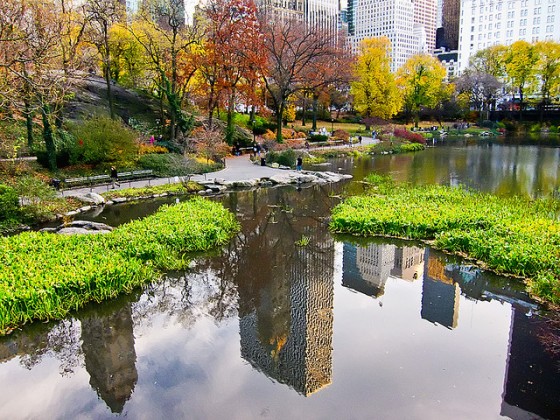
7 Ways to Green Your Everyday Routine
 Image by Ben / Creative Commons
Image by Ben / Creative Commons
People are constantly talking about “going green” or being more environmentally-friendly, but what does that really mean? Does it mean you have to change the entire way you live your life? Should you get rid of everything from your cleaning supplies to your car in order to lessen your environmental footprint? Well, in actuality no, you don’t need to do that.
People shy away from adding “green” actions into their daily lives for a variety of reasons. Some think it takes too much time, others think it will cost more money, and other people believe there is no real reason to change because what they do doesn’t really matter. The thing is, what you do does matter. Even the little things add up quickly. And no…before you start grumbling, you don’t need to move mountains or go to some crazy extreme in order to make a change.
Start with implementing these 7 ways to green your everyday routine, and then go from there. How far you go is your decision. What kind of an impact you want to make is up to you.
1. Waste not, want not. Buying in bulk may work for some families, but it doesn’t work for everyone. How many times have you purchased food at the store to only have it later go bad in your fridge leaving you with “nothing” left to eat? Or you make a large meal and end up tossing part of it because your eyes are bigger than your stomach.
An easy way to prevent this is to plan ahead. Plan your meals, work out your recipes and buy only what you need. Europe is taking a stand on food waste. In fact, Parliament recently called upon the European Commission to take measures in order to cut food waste in half by the year 2025.
2. If you can’t buy eco, at least buy well-made. Not everyone wants to buy eco or organic, even if they do they may not be able to afford buying the “green” items they need. In cases like that it is best to buy well-made. Buy items that will last for years and years to come, not disposable items that have to constantly be replaced.
 Image by Joshua Hoffman / Creative Commons
Image by Joshua Hoffman / Creative Commons
3. Toss your work waste out the window. Not literally, of course. What I mean is while you are at work, take a look at some of your daily routines. Becoming aware of what you do day to day will allow you to see what wasteful actions you can remove from your routine. Do you print documents only to then toss them because you no longer need them? Do you buy bottled water rather than filling up your cup or mug at the water cooler? Do you leave your computer on at night? Do you turn off the lights when leaving a room? All of these things add up.
4. Walk away from your problems. Now this I mean literally. If you are feeling down, maybe a little blue or your having trouble resolving an issue at work or home, go for a walk. Going for a walk can help you clear your mind, allow you to get some time outdoors, add a little exercise into your day, and to top if off, you may just find yourself relaxed enough to be able to resolve those issues.
5. Cut down on water waste. Admit it, wasting water is something most of us do without even thinking about it. You turn on the water to brush your teeth, wash a dish, water the plants, etc. and all of a sudden you notice the faucet has been running a lot longer than it really needed to be.
The easiest way to cut down on water waste is to be aware of your actions. Turn on the water, use what you need, turn it off. Don’t run the dishwasher or washing machine half-full. Turn off the water while you brush your teeth. Take shorter showers. Don’t leave your sprinklers running on rainy days. A bonus for cutting down on water waste is you’ll probably notice a drop in your water bill too.
 Image by Diego Torres Silvestre / Creative Commons
Image by Diego Torres Silvestre / Creative Commons
6. Fresh air is your friend. Many people spend the majority of their day indoors. Indoor air pollution is a big problem. You may not know how it affects you, but indoor air pollution is often worse than outdoor air pollution. One of the simplest ways to lower indoor air pollution is to air out your home by leaving your windows open at least once a day. Here are a few more ways to reduce indoor air pollution.
7. Reduce, reuse and recycle. Okay, that is really three things, but they really go together. One of the most basic ways to green your everyday routine is by taking a look at your regular actions and determining how you can either reduce, reuse or recycle. How can you reduce your vehicle emissions? How can you reuse that material you are about to throw away? What can you recycle?
When it all comes down to it, many of us have “green” actions built into our daily routines right now. Take some time and see how you can make your daily routine a little greener. Then let me know – I’d love to hear what you are doing to green your everyday routine!



Post a comment